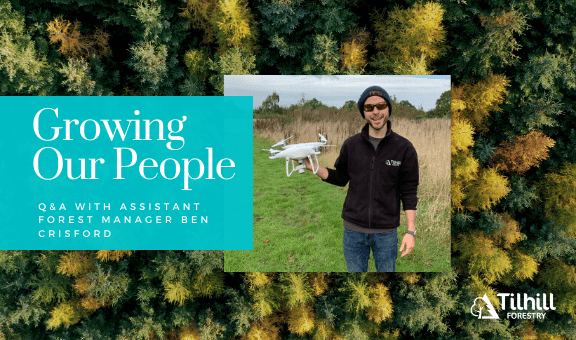Read our Q&A with one of South West Scotland’s Assistant Forest Manager’s Ben Crisford.
What do you do? Tell us about your typical day?
I am an Assistant Forest Manager in the Dumfries office which involves supporting Senior Forest Managers mostly with the day-to-day management of our managed properties and new planting schemes.
There isn’t really such a thing as a “typical day working in forestry”, but in South West Scotland – it is usually raining.
A day in the office is generally taken up with emails, preparing maps and work instructions for contractors and other administrative tasks. But fortunately, in this job, at least a few days each week will be spent on site. Site visits involve surveys and monitoring to inform our management decisions, meetings with clients and contractors and the monitoring of work to ensure a high quality is delivered.
How did you get into forestry?
Forestry was a career path that I wasn’t aware of when I was growing up, and when I did discover it, by chance, it was something that interested me immediately.
I was fortunate after leaving school to find a job working for a local charity, helping to manage a sweet chestnut coppice. This was a fantastic job which cemented my interest in forestry, and I made the decision to pursue a woodland ecology degree and gain a formal qualification.
I attended the National School of Forestry (part of the University of Cumbria) and graduated in 2018, joining Tilhill Forestry soon afterwards.
What do you like the most about working in this industry?
There are obvious advantages to working in forestry in the UK. For one thing, you get to work outdoors in some of the most remote and beautiful parts of the country. Also, for me, the ability to bring your dog along with you is a massive perk.
In addition, forestry is a relatively small industry in the UK, which gives it a friendly feel. You are constantly dealing with the same suppliers, contractors, clients and other stakeholders which allows you to build good relationships. It’s not quite “everybody knows everybody”, but if you don’t know them – you know someone who does.
Why did you decide to work for Tilhill Forestry?
I joined Tilhill Forestry as part of the graduate programme which appealed to me as being an excellent learning opportunity. The Dumfries office, being one of the largest, is a great environment to learn in.
What do you like most about this company?
Since I’ve been with Tilhill Forestry everyone that I’ve gone to with a question has been happy to help and they’ve been generous with their time – there definitely seems to be a culture of this within the Company.
Knowledge sharing goes on within district and between districts. This is a definite advantage of being employed by (or employing) a large company, and for a relative newcomer like me, it is very useful for learning the ropes.
How do you feel Tilhill Forestry contributes to its employees’ professional development?
Since I started with Tilhill Forestry my training needs have been met by a variety of courses, ranging from IOSH training in Health and Safety management to a drone pilot qualification. Training requirements are reviewed annually.
Tilhill Forestry also encourages membership of the Institute of Chartered Foresters (ICF) and pays for its employees’ subscriptions.
What sorts of changes are occurring in your occupation?
One change that I have witnessed even in my short time is the accelerated adoption of new technologies, a few examples below:
- Increasingly, we are moving away from having many different ‘gadgets’ and instead using apps on our smartphones to fulfil the same function.
- Theft from work sites has recently been reduced by a sudden influx of remotely controlled security robots (colloquially called Daleks).
- We are using drones more frequently to save time and gain valuable insights from a birds-eye view.
It is difficult to imagine what the industry’s technology will look like in 10 years’ time, but hopefully we will still get out into the woods occasionally and not operate entirely from a shipping container with an Xbox controller.
How does a person progress in your field?
In forest management, for those who wish to, there is the opportunity to take on more responsibility by becoming an ‘Area Manager’ or eventually a ‘Regional Manager’ as you gain experience. However, this isn’t for everyone as many people in forestry might prefer to stay more hands-on.
What is your advice to anyone wishing to pursue forestry as a career?
Getting some practical experience is a big advantage. A big part of a forester’s job is finding solutions to practical problems- often in difficult locations, so understanding the specific challenges of operations (e.g. fencing) is very useful and gives you a head-start.
Perhaps counter-intuitively, a lot of a forester’s time is spent sat at a computer and a disproportionate amount of this is spent on spreadsheets and maps. Having a good knowledge of GIS mapping software and Microsoft Excel is a big advantage and a time-saver so it’s worth investing some time brushing up on.
However, none of this is essential. If you like dealing with people, you have an interest in silviculture and you don’t mind standing on a windy hill, squinting through the rain looking for weevils – then forestry could be the career for you.



